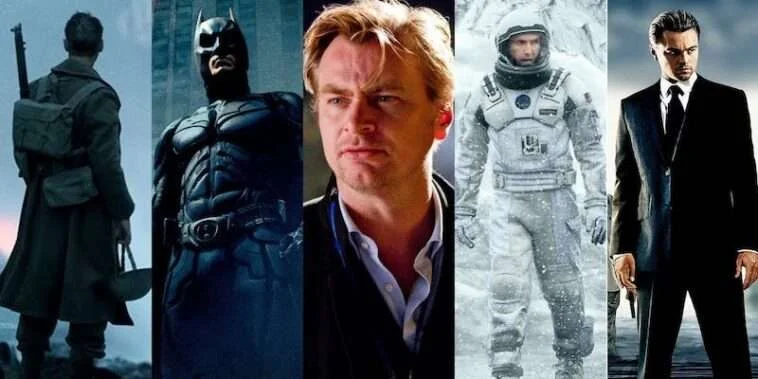Christopher Nolan is a filmmaker whose name has become synonymous with cinematic excellence, innovation, and storytelling prowess. With a career spanning over two decades, he has cemented his place as one of the most influential directors of his generation. This biography will delve into the life, career, and the cinematic brilliance that defines Christopher Nolan, as well as an exploration of some of his best movies and why they are considered iconic in the world of film.
Early Life and Education
Christopher Edward Nolan was born on July 30, 1970, in London, England. He grew up in a family that had a deep appreciation for the arts. His father, Brendan Nolan, worked as an advertising executive, and his mother, Christina Nolan, was a flight attendant. Nolan’s exposure to the world of storytelling and creativity began at a young age. He was particularly drawn to literature, film, and photography.
Nolan attended the University College London (UCL), where he studied English Literature. During his time at UCL, he developed a keen interest in filmmaking and made several short films with the university’s film society. It was here that he honed his skills in storytelling, cinematography, and editing.
Christopher Nolan’s net worth reflects his immense success in the film industry. Christopher Nolan’s net worth is around $250 million.
Nolan’s ability to attract both critical acclaim and commercial success has made him one of the highest-paid directors in Hollywood. His films consistently perform well at the box office, earning hundreds of millions of dollars worldwide.
Personal Life
Despite his massive success, Christopher Nolan maintains a relatively private personal life. He is known for his dedication to his craft and often shies away from the public eye. Nolan’s wife, Emma Thomas, has been a long-time collaborator and producer on many of his films. The couple shares four children and has managed to keep their family life out of the media spotlight.
In addition to his filmmaking, Nolan is an advocate for the preservation of celluloid film and has played a significant role in promoting the use of film over digital formats in the industry. He has also received numerous awards and accolades throughout his career, including Academy Award nominations for Best Director.
The Early Years: Crafting a Vision
After completing his education at UCL, Christopher Nolan embarked on his journey in the world of filmmaking. His first feature film, “Following” (1998), was a low-budget, black-and-white neo-noir thriller. The film showcased Nolan’s talent for intricate storytelling and non-linear narratives, elements that would later become hallmarks of his work. “Following” was well-received at film festivals and marked the beginning of Nolan’s unique cinematic style.
Breakthrough with “Memento” (2000)
It was Nolan’s second feature film, “Memento” (2000), that catapulted him into the limelight. This psychological thriller, based on a short story by his brother Jonathan Nolan, showcased Nolan’s ability to challenge conventional storytelling norms. The film’s narrative was structured in reverse, immersing the audience in the fragmented memory of its protagonist, Leonard Shelby, played by Guy Pearce.
“Memento” was a critical and commercial success, earning Nolan widespread acclaim and establishing him as a filmmaker with a penchant for mind-bending narratives. The film’s exploration of memory, identity, and the nature of truth became recurring themes in Nolan’s later works.
The Dark Knight Trilogy: Redefining the Superhero Genre
In 2005, Christopher Nolan took on the daunting task of reviving the Batman franchise with “Batman Begins.” This film marked the beginning of “The Dark Knight Trilogy,” a series that would redefine the superhero genre. Nolan’s approach was grounded in realism and character development, providing a stark departure from the campy Batman films of the past.
The second installment, “The Dark Knight” (2008), is often hailed as one of the greatest superhero films ever made. It was the late Heath Ledger’s portrayal of the Joker that garnered the most attention, earning him a posthumous Academy Award for Best Supporting Actor. Nolan’s direction and storytelling in “The Dark Knight” elevated the superhero genre to new heights, delving into complex themes of chaos, morality, and the consequences of one’s actions.
The Cinematic Puzzle: “Inception” (2010)
“Inception” (2010) marked another pivotal moment in Christopher Nolan’s career. The film, starring Leonardo DiCaprio, explored the concept of shared dreaming and the manipulation of reality within dreams. “Inception” challenged audiences with its intricate narrative layers and visual effects, leaving viewers pondering its philosophical implications long after the credits rolled.
Nolan’s meticulous attention to detail and commitment to practical effects, such as the iconic rotating hallway fight scene, showcased his dedication to pushing the boundaries of cinematic storytelling. “Inception” not only became a box office success but also solidified Nolan’s reputation as a master of cerebral cinema.
Interstellar Exploration: “Interstellar” (2014)
“Interstellar” (2014) saw Christopher Nolan venture into the realm of science fiction. The film, set in a dystopian future where Earth faces environmental collapse, followed a group of astronauts on a mission through a wormhole in search of a new habitable planet. Nolan’s commitment to scientific accuracy and his collaboration with physicist Kip Thorne lent the film an air of authenticity.
“Interstellar” explored themes of love, time dilation, and human survival while taking audiences on an emotional and visual journey through the cosmos. Hans Zimmer’s haunting score and the breathtaking visuals of space contributed to the film’s epic scale and emotional resonance.
Dunkirk: A Masterclass in Tension
“Dunkirk” (2017) marked yet another departure from Christopher Nolan’s previous works. This World War II epic was an exercise in tension and immersive storytelling. The film depicted the evacuation of Allied soldiers from the beaches of Dunkirk, France, during a harrowing battle.
Nolan’s decision to tell the story through three distinct timelines—land, sea, and air—created a sense of urgency and suspense. The absence of a traditional protagonist and the use of practical effects and minimal CGI added to the film’s realism. “Dunkirk” earned Nolan his first Academy Award for Best Director, cementing his status as a visionary filmmaker.
Tenet: A Mind-Bending Espionage Thriller
In 2020, Christopher Nolan released “Tenet,” a high-concept espionage thriller that once again showcased his fascination with time and inversion. The film’s complex narrative, intricate action sequences, and innovative use of time as a central theme challenged audiences and critics alike.
“Tenet” reinforced Nolan’s reputation for pushing the boundaries of cinema, and its release during the COVID-19 pandemic demonstrated his commitment to the theatrical experience. Despite the challenges of the pandemic, the film garnered attention for its visual effects and technical achievements.
Oppenheimer: A Modern Masterpiece
Christopher Nolan’s three-hour historical film about the famous theoretical scientist J. Robert Oppenheimer, who was a key part of the Manhattan Project that made the first atomic bomb during World War II, finally came out in theatres on July 21. Cillian Murphy plays Oppenheimer, who was a key part of the Manhattan Project that made the first atomic bomb. Based on the non-fiction book “American Prometheus” and led by some of Hollywood’s best actors, “Oppenheimer” tells the story of how the U.S. tried to make the weapon of mass destruction that destroyed Hiroshima and Nagasaki in 1945, as well as the far-reaching consequences and unsolvable moral dilemmas that came with it.
Christopher Nolan’s Legacy and Impact
Christopher Nolan’s impact on cinema extends far beyond his filmography. His commitment to practical effects, storytelling innovation, and dedication to the cinematic experience have left an indelible mark on the industry. He has inspired a generation of filmmakers to explore the possibilities of storytelling through the lens of film.
Nolan’s ability to merge intellectual depth with blockbuster entertainment has made him a filmmaker whose works resonate with both critics and audiences. His films invite viewers to engage with complex themes and narratives, sparking discussions and interpretations that continue long after the credits roll.
Christopher Nolan’s journey from a young film enthusiast to a cinematic visionary is a testament to his dedication to the art of storytelling through film. His ability to challenge conventions, explore complex themes, and craft visually stunning narratives has earned him a place among the pantheon of great directors.
Mahira Khan: Top dramas, Movies, Age and Family
Nolan’s impact on cinema extends beyond his filmography; he has influenced a new generation of filmmakers and continues to inspire audiences worldwide. His commitment to the theatrical experience and his unwavering dedication to pushing the boundaries of storytelling ensure that Christopher Nolan’s legacy in cinema will endure for generations to come.





